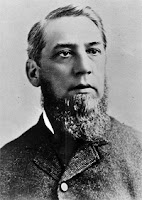Putting an end to one of the valley’s most popular urban
legends is nothing more than a game of Whack-a-Mole. The harder you beat it
down, the quicker it pops up again.
The well-worn story says the railroad bypassed Jacksonville
in 1883 because the residents couldn’t pay a $25,000 bribe.
 |
| Jacksonville, Oregon |
It fits so well with the image of a greedy corporate giant
taking advantage of simple, small-town country bumpkins. How could it not be
true?
First, consider that Jacksonville contained 1,000 or fewer
people. That means every man, woman and child would’ve had to pay $25 — not
exactly the national debt, but roughly equivalent to $568 in today’s dollars.
Then, there’s the “evil” chief executive officer in charge
of the railroad, Henry Villard. While on a fact-finding western tour in spring
1883, Villard told a meeting of Oregon businessmen that building the railroad
from Roseburg to the California border was more difficult than originally
thought.
“It turned out after construction was started,” he said, “that
the line will need a great deal more money than we expected. We have
miscalculated the cost of the Southern Extension. We will need
 |
| Henry Villard |
But Villard wasn’t asking for bribes from the public. He was
asking his original railroad investors to arrange a second mortgage at the
conservative estimate of $10,000 per uncompleted mile. At the time, 100 miles
were yet to be built.
“Mr. Villard declined to receive $30,000, or any subsidy
whatever,” read a newspaper report. “He stated that it was not the policy of
the companies he represented to take subsidies. Their intention was to furnish
the citizens of the Northwest with needed transportation facilities at their
(the railroad’s) own cost.”
Even if Jacksonville could have raised $25,000, it would
have been chump change to the railroad. So, how did the legend get started?
Some say prominent citizens Cornelius Beekman and Henry
Klippel had circulated a subscription list
 |
| Cornelius Beekman |
Whatever the facts, when it was announced that the railroad
would locate along Bear Creek, five miles east of Jacksonville, in a new town
to be built on land partially owned by Beekman, people began to wonder. Was
Beekman cashing in because he couldn’t bribe the railroad?
Businessman P.J. Ryan placed an advertisement demanding
Beekman produce the subscription list and delete Ryan’s name and pledge, but
Beekman conveniently couldn’t find the list.
There’s more to refute the story, but the clincher is
testimony from Beekman’s son, Ben, who was 19 at the time.
“This is not true at all,” he told an interviewer from the
Federal Writers’ Project in 1939.
 |
| Benjamin Beekman |
The railroad wanted to avoid the expensive foothills, he
said, and have a direct and flat route to Ashland where a large maintenance
yard could be built.
“Considering these things,” he said, “the citizens of
Jacksonville saw it was useless to raise money. This is the real reason why the
railroad now runs through Medford instead of through Jacksonville.”
Whack! Another mole down, but don’t hold your breath.
Another one’s probably due any second.
 |
| Jacksonville, Oregon 1880s |


